

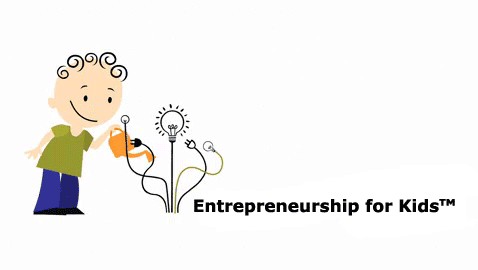
Beyond the cutting-edge experiential learning described on this page and on the "Experiences from the program part II" page, one of the most significant experiences in the the Entrepreneurship for Kids Program is executing a project. The project solely belongs to the students, from idea to execution, marketing, and performance.
Israeli schools implementing this entrepreneurship program for young students take part in the realization of many projects. I recommend you read about some of them on the Kids Initiate page.
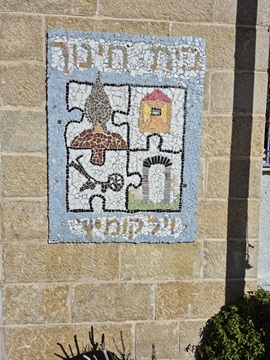
Galit Zamler conducted two consecutive days of workshops for students at Vilkomich School in Rosh Pina.
Fifth and sixth-grade students participated in the workshop "Public Speaking", where they practiced standing in front of the class and presenting in an experiential, supportive, and engaging way.
This is also the place to thank the school principal, Vicky Modelinger, for the warm recommendation she gave to Galit Zamler following the workshop.
"To whom it may concern,
We would like to recommend the public speaking workshop delivered by Galit Zamler to our 5th and 6th-grade students at our school.
The workshop focused on developing public speaking skills and on understanding that speaking in front of an audience is an acquired skill that can be learned and improved through practice and hands-on experience. Galit spoke with the students about different types of public speaking and emphasized the importance of delivering clear and confident messages, even in creative and focused situations.
During the workshop, students were given practical tools for coping with public speaking, including body language and vocal tone. Learning took place through active participation, with experiential exercises that challenged students to handle unexpected situations and speak in front of the class in an engaging and confident manner.
One of the most meaningful parts of the workshop was a practical presentation practice without prior preparation, aimed at strengthening self-confidence and the ability to perform under pressure. Students gained an understanding of the importance of preparation, first impressions, and the messages we convey even without words.
The workshop took place in a pleasant, supportive, and encouraging atmosphere that allowed students to experiment, make mistakes, laugh, and learn without fear of criticism. High levels of engagement were observed, along with a strong willingness among students to practice public speaking and present in front of their peers, even in challenging situations.
Galit facilitated the workshop with professionalism, sensitivity, and a strong ability to connect with students, encourage them, and provide practical tools that will accompany them going forward.
I highly recommend this workshop to any educational framework seeking to strengthen students' self-expression, confidence, and public speaking skills.
Sincerely,
Vicky Modelinger
Principal, Vilkomich School
Rosh Pina"
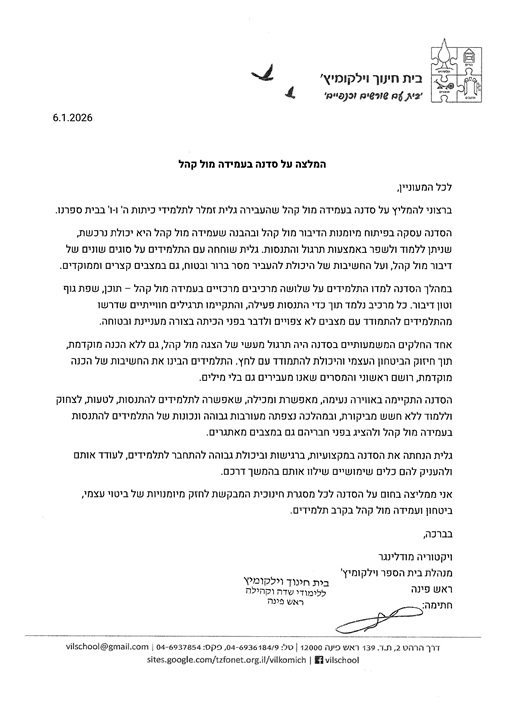

One of the modules in the entrepreneurship program syllabus is "Presentation and Public Speaking."
Due to demand from schools, this module has been adapted into a one-time workshop conducted by Galit Zamler for students, teachers, and the general public.
Recently, Galit delivered this workshop to the Nachshon classes at "Aviv" High School in Ra'anana, to the teaching staff of Ramot Weizmann School in Yavne, and students in the law track at Yitzhak Navon High School in Rishon LeZion.
In all workshops, participants enjoyably and actively participate.
They learn to pay attention to content, tone of voice, and body language. Thanks to the visual aids accompanying the workshop, by the end, participants internalize how to project confidence when standing in front of an audience.
The Youth Department in Be'er Sheva has established a youth empowerment space called "The Social Accelerator."
This place enables young people to lead change through involvement, inclusion, entrepreneurship, leadership, creativity, and opportunity identification.
The space gives every young person the tools to succeed and develop optimally while promoting leadership, entrepreneurship, and equal opportunities.
As part of the vision implementation process, Galit Zamler is training the Youth Department's leading team to promote entrepreneurship processes with the city's youth.
In the training series, the team learns the following topics:
- Introduction to social entrepreneurship
- Focusing and refining project ideas
- Identifying resources needed for the idea implementation and locating sources for their recruitment
- Pricing, budget management, and building an action plan for idea implementation
- Marketing and communicating the project
- Preparing a pitch and presentation for the project
One session is dedicated to training the team to independently lead a hackathon while experiencing a mini-hackathon as a model.
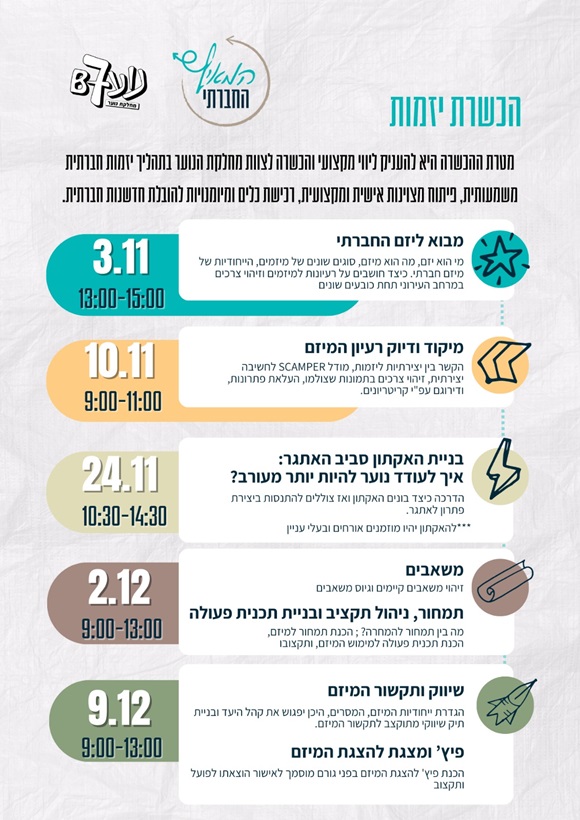
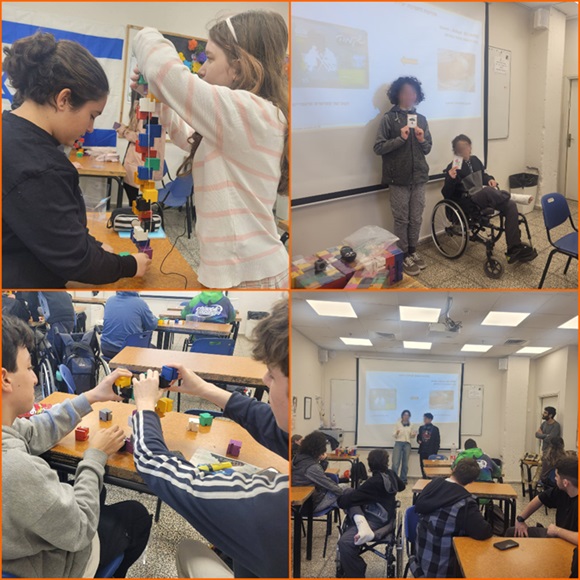
To think of groundbreaking project ideas, creative thinking is required. Galit Zamler, from her experience as an entrepreneur and as the leader of the entrepreneurship program, has developed a creative thinking workshop tailored to different audiences.
This time, the workshop participants were 9th and 10th-grade students at Ankori School in Petah Tikva.
What do we do in the workshop? Together, we understand what prevents people from thinking creatively. Alongside this, we are exposed to examples of people who were not afraid to express their creativity and pursue their creative ideas.
In addition, we practice creative thinking exercises and invent inventions.
After attending the workshop, attendees feel that they are allowed to think creatively and that their creative thinking can have a meaningful impact on society.
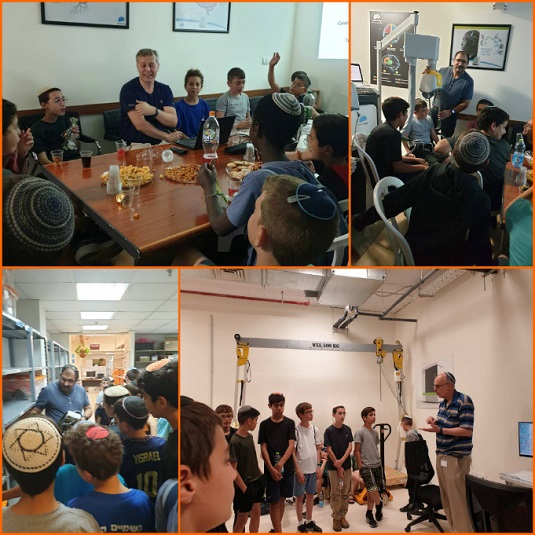
School students from Harel religious school in Jerusalem attended a tour of two companies developed by their parents in Har Hotzvim as part of entrepreneurship classes.
The first company is Inziv, which provides inspection and metrology tools for the microLED industry.
As for the second company, it developed a helmet specifically for people with psychiatric problems.
Nava Eldar, the school's entrepreneurship coordinator, says both the students and teachers who accompanied them found the experience fascinating and inspiring.
As the students returned from the tour, they were excited, but it was clear that it would take some time to digest and process what they had seen.
There is no doubt that such an experience is the most effective way to inspire students and expose them to innovation.
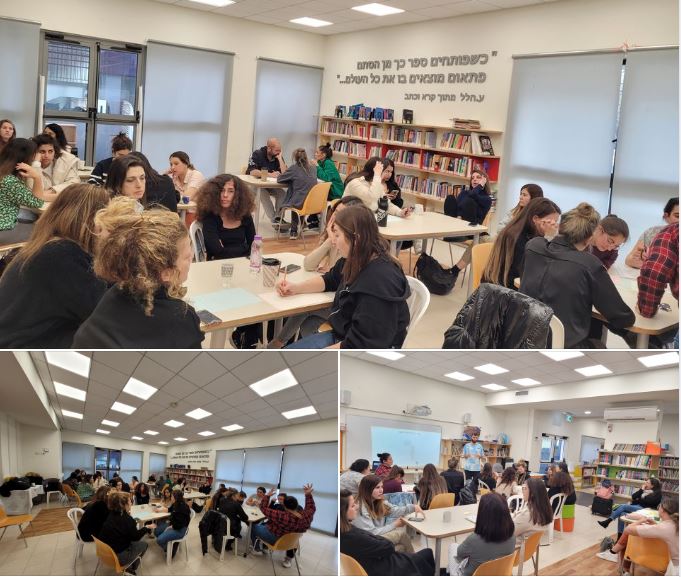
The staff of HaMashtela School, managed by Revital Akav, are studying the "Entrepreneurial Skills" program. Training sessions were conducted for the teachers to prepare them to teach the program.
A workshop called "Accelerated Entrepreneurship Process" was also held for the entire team - the purpose of this workshop was to provide teachers who teach the entrepreneurial program, as well as teachers who don't, with the opportunity to experience the stages of entrepreneurship.

Twenty-five South American educators, principals, and teachers visited the HaYovel School in Ashdod, headed by Pnina Weinstein.
School staff members described to the delegation the educational concept the school promotes, which emphasizes individual perspectives.
Two students led the tour at the school to introduce the guests to the diverse learning methods and school projects.
Since the school teaches the entrepreneurship program Galit Zamler has developed for many years, she invited the delegation to visit there.
Local media also covered the delegation's visit.
The students from Israel participated for the first time in an international event where students from all over the world presented their ideas for projects for 24 consecutive hours.
Israel was represented by teams that won the hackathons led by Galit Zamler, including the Gymnasia Hasrealit School in Rishon Lezion, Teddy Kollek High School in Jerusalem, and Gvanim Middle School in Kadima-Zoran.
The students made the pitches in English, and they were all recorded and uploaded to YouTube.
The following is the pitch video of the Gymnasia Hasrealit students with a student from the Philippines:
Students of the HaYovel School in Ashdod, headed by Pnina Weinstein, have been studying the EFK program for several years.
This year, in honor of Hanukkah, we held a joint session of the HaYovel School students with the Bridgeman School of Languages students in China. They also participated in an entrepreneurship course led by Galit Zamler.
The purpose of the meeting was to bring the two people closer together. The Israeli students told us about the Jewish Hanukkah holiday. And the Chinese students told us about the Chinese New Year, Spring Festival.
Both sides were excited and felt honored to get to know each other.
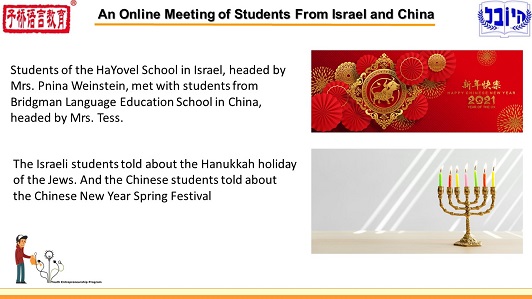
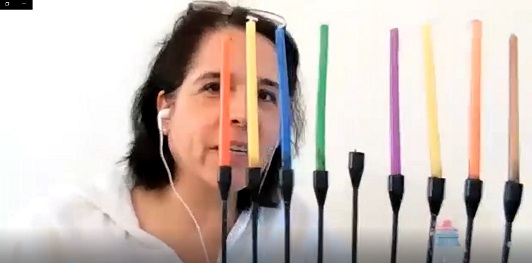
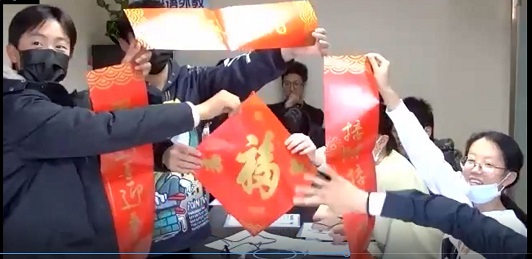
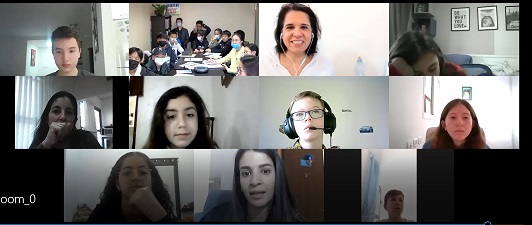
Talma Travel and Tours Ltd. has a lovely project, which was launched following the COVID-19 pandemic. The company organizes online, enriching meetings for its travel agents to make the stay-at-home period pleasant.
Galit Zamler was invited to tell Talma's employees and travel agents the story of the Entrepreneurship for Kids Program. The lecture also dealt with the entrepreneurial culture and norms that make Israel a startup nation.
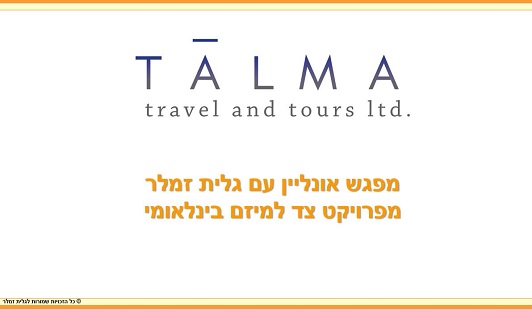
It's the second time this month that the A.D. Gordon school is hosting a delegation of educators from developing countries.
This time, a delegation of school principals, teachers, and academic coordinators arrived from Colombia.
The delegation members were exposed to the variety of programs that the school is offering its students and to the different teaching methods.
The school principal, Gila Ben-Yosef, elaborated more about the skills that the school is imparting to the kids and the aspiration to prepare them for life.
At the end of the visit, Galit Zamler held a lecture explaining how to instill a culture and language of entrepreneurship in schools.
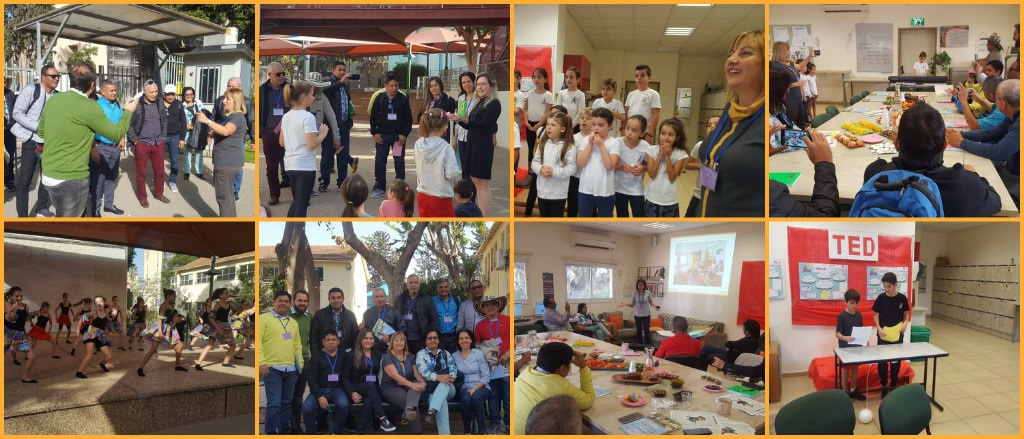
Students in India are studying the Israeli EFK Program. Teachers are being trained as well, so that they can teach more students. The goal is to teach many children life skills.
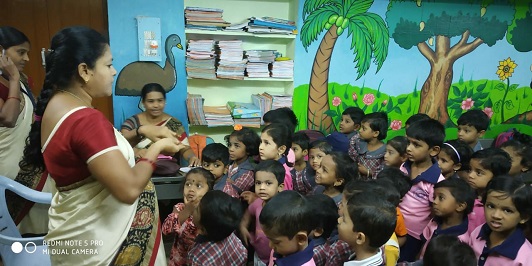
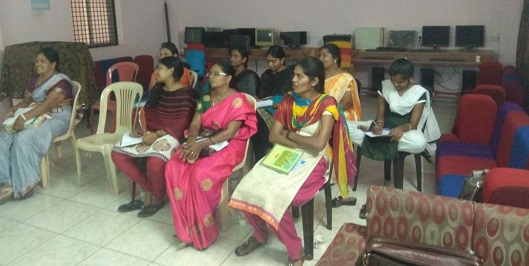
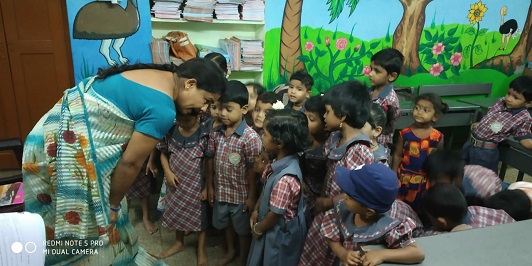
Vietnamese children participate in the Israeli entrepreneurship program.
The first session included a warm-up exercise for formulating the group and developing an entrepreneurial mindset.
The children learn entrepreneurial models such as the "SMART Model" for goal setting. They apply those models to their project ideas.
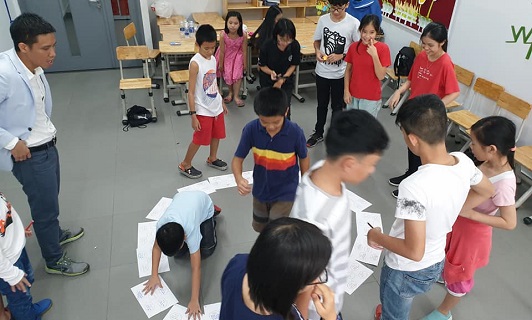
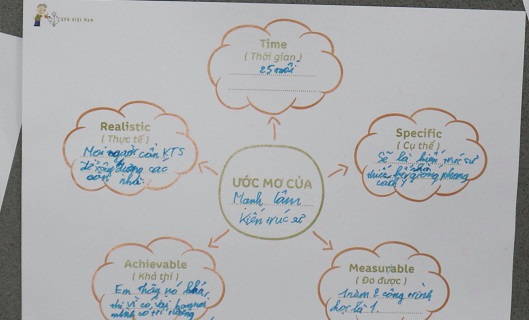
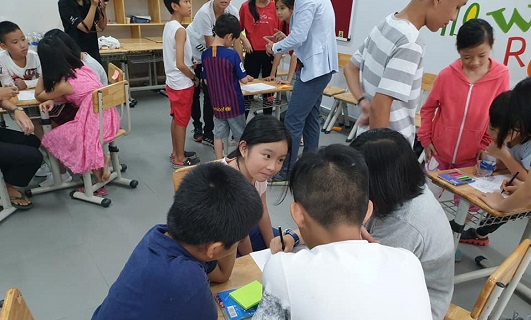
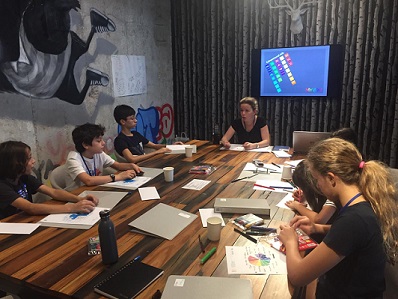
At the end of an entrepreneurship course for children in Hong Kong, the instructors wrote:
"A ten-session entrepreneurship course in Hong Kong, based on the EFK program, has come to an end.
The children succeeded in setting up two projects with a social impact. It demanded thinking and creativity.
"The experience itself during the course and the way to the final product were exciting and unique.
As part of the values and skills the children learned during the course, they underwent unique activities, such as practical activities on 'thinking out of the box.'
The children created a real box that contained personal characteristics of each of them. After removing the box from their heads, they understood what it meant to think outside the box.
The road was not easy. For example, the tent model went through several plans and reincarnations until it reached its final configuration.
The children discovered that the original idea they considered for building the model was not feasible, and they almost gave up. But, just like real entrepreneurs, they learned from failure and found a more creative and efficient solution that ultimately enabled them to produce a better product.
The children said, before the course, they could not believe children could change the world. They added that the course made them want to continue doing and creating great things.
Best Regards,
Miya"

Galit Zamler accompanied a delegation of leading educators from the Ministry of Foreign Affairs, all from developing countries, to a visit to the MLA Hub.
Eti Vidavsky, a serial entrepreneur who leads the innovation center, told the delegation members about the center's activities as an incubator for entrepreneurs.
Students who participate in the program, which lasts two semesters, are eligible to earn academic points and develop their ideas. They do this with the assistance of experienced mentors, who provide their time and knowledge.
Seven students aged 9-15 took part in the first entrepreneurship course in China. It's based on the Israeli entrepreneurship for kids' curriculum.
The course took place in a summer camp format. The children learned about various subjects from the entrepreneurship field, along with fun activities and developing two projects into a mode. The first project was a smartpen, and the second one was fitness training for blind people.
In these pictures, the children present their ideas for projects, the smartpen, and a fun, challenging activity.

Mrs. Zamler has been leading an institutional training at the Ramot Weizmann School in Yavne on the subject of "meaningful learning and functional learning in entrepreneurship education."
Mrs. Zamler has a close acquaintance with the school and its impressive achievements in education for entrepreneurship. School allows students to choose, make mistakes, change, explore, experience, and work as a team. All these led her to recommend MASHAV, Israel's Agency for International Development Cooperation at the Ministry of Foreign Affairs, to visit the school with a delegation of leading Latin American educators, knowing this school would serve as a model for entrepreneurship in education.
Choosing this school turned out to be the right decision. The visit was successful, and the education processes embedded in the school made a great impression on the delegation members. This was learned through a letter received by the school's principal from one of the delegation's members, Professor Luis Oscar Diaz, technical supervisor of the Ministry of Education on schools in Argentina.
Delegation's organizers sent a thank-you letter to the school, which they wrote (in Hebrew).
This presentation summarizes the visit:
Among the members of the delegation were professors and those from the higher education system in Latin America. To present a complete picture of the entrepreneurial processes that Israelis experience from childhood to maturity, Mrs. Zamler accompanied them on a visit to the Novus Center of Entrepreneurship at the College of Management.
The visit went well, thanks to Professor Dafna Kariv, Vice President of the College of Management and the founder of Novus Center, Dr. Gali Ingber, Academic Director of the College, and Galia Shutz, the administrative director of the college, who spoke together about the programs being studied at the college. Tal Berman, the director of the Center, presented the ventures along with two alumni entrepreneurs.
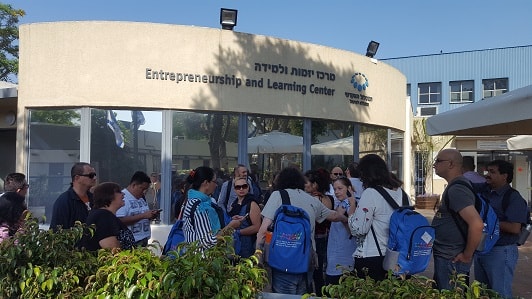
Entrepreneurship Workshop
At the end of the visit, the delegation participated in a workshop led by Galit Zamler. It focused on entrepreneurship education and skills development. The delegation members both enjoyed and learned.
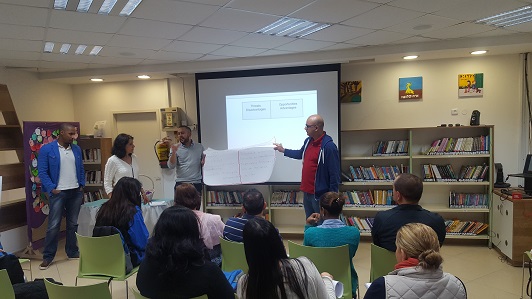
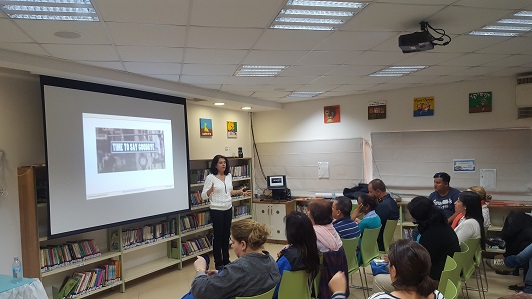
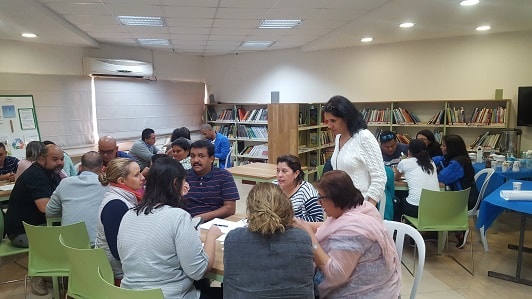
Following two successful visits and the workshop on entrepreneurship, the delegation's organizer, Mr. Damian Filut, sent Galit Zamler an appreciation letter.
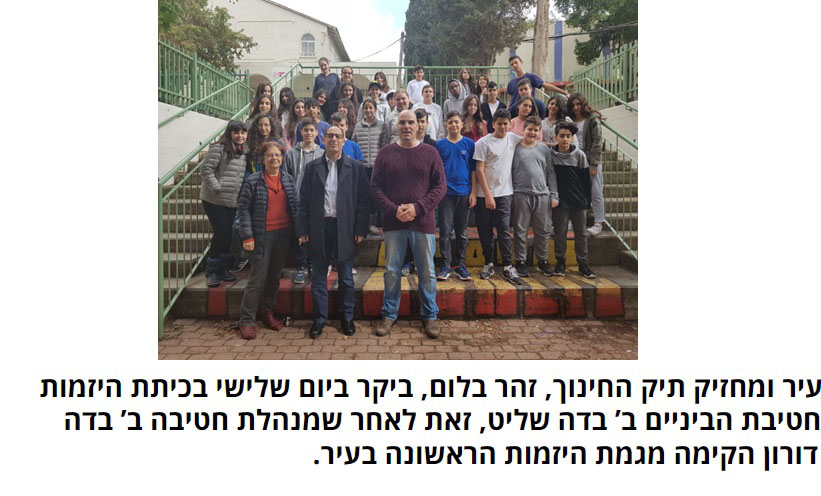
In 2018, an entrepreneurship track was first launched in the De Shalit Middle School in the city of Rehovot, under the guidance of Galit Zamler.
The deputy mayor, who is also in charge of education, visited the school to meet with the program leaders. He learned about the learning process.
The online magazine News 08 wrote about this event.
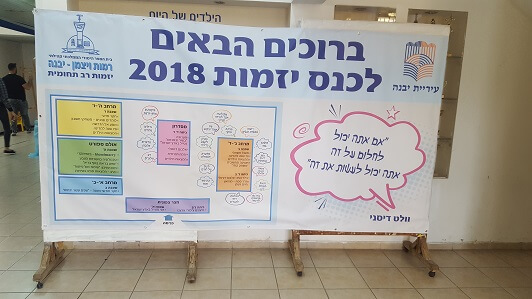
The Ramot Weizmann School, run by Amalia Swisa, organized a multi-disciplinary entrepreneurship conference, focused on a summary of the year's entrepreneurship, activities, research, and teaching.
The excited children presented their projects and enjoyed enthusiastic feedback from the conference guests.
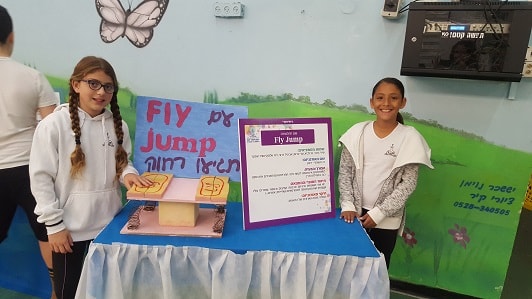
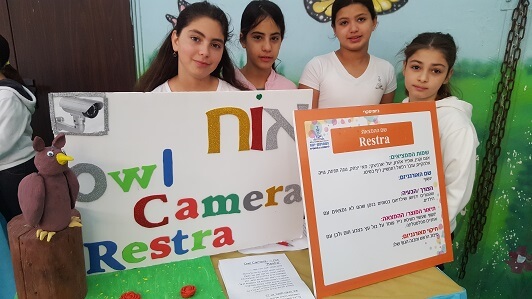
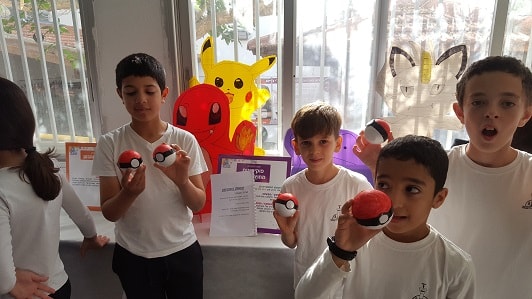
Before the conference, the students understood that it was important to pay attention to how they presented their projects. They practiced standing in front of an audience and telling short and interesting pitches.
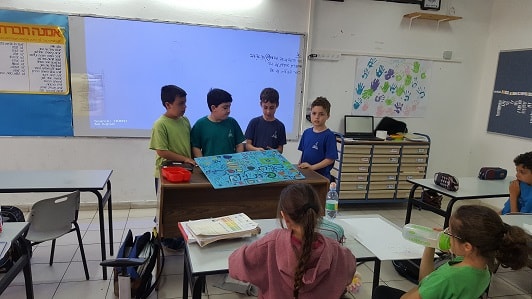
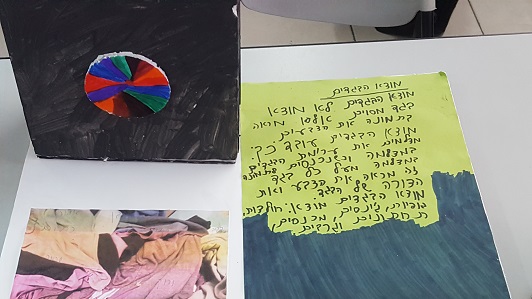
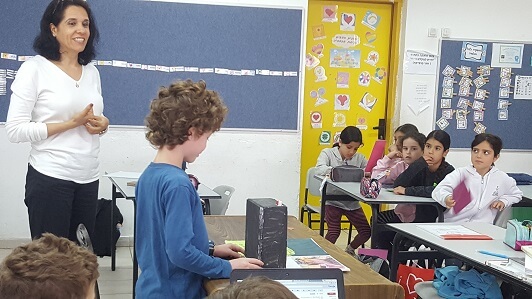
The children came up with many inventions, including a scooter suitable for both land and sea, a device that enables people with hand disabilities to open doors with ease, and a machine to help people quickly dress. Other items included a kit to help children with attention and concentration issues swallow big pills, turning the school into an open school, and more.
This video captures the entrepreneurship summit event at the Ramot Weizmann School:
Students from the "Nofim" School in Kanot, under the guidance of Yehudit Priva, participated in social entrepreneurship lessons and raised questions at the beginning of the learning process:
- What is entrepreneurship?
- Who needs entrepreneurship?
- Who invented social entrepreneurship?
- Does the community benefit?
- How many types of entrepreneurs are there?
- Does social entrepreneurship cause discomfort?
- Who was the first social entrepreneur?
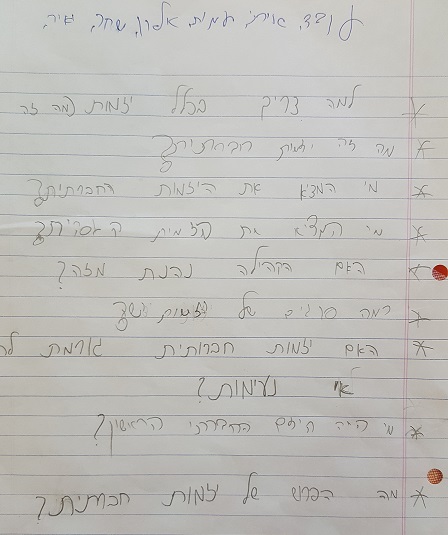
Students from the Hebrew Academy in Florida, led by Rabbi Avi Bossewitch, participated in weekly entrepreneurship classes as an elective course. Their guides were teachers Angie Lopez, Javier Gonzalez, and Chani Richmond.
The class called Entrepreneurs STEAM included aspects of entrepreneurship based on our program for creating a problem-solving service or product.
Here are some pictures that illustrate the process the students went through during the entrepreneurial part of the elective course:
1) Problem-solving
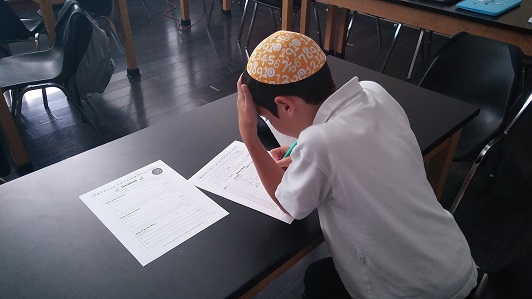
2) Prototype creation
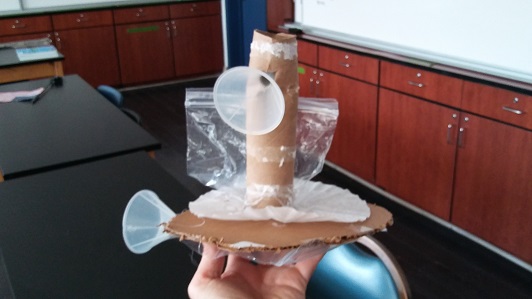
3) Product testing
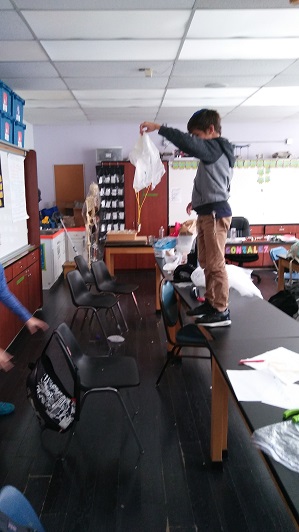
4) Prototype modification
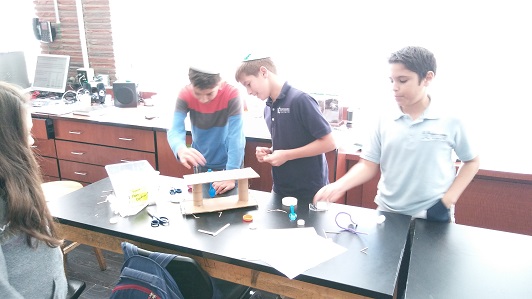
Seventh graders in ORT Holon participated in a three-day Hackathon event. On day one, we exposed students to the entrepreneurial world. On day two, they raised ideas for projects. On the last day of the event, they prepared models and made pitches.
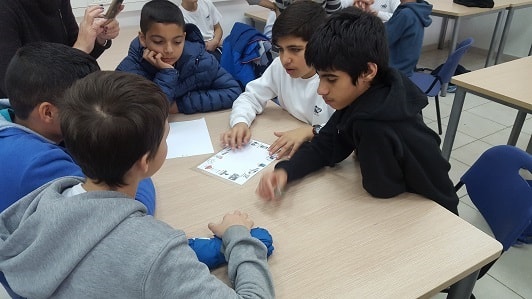
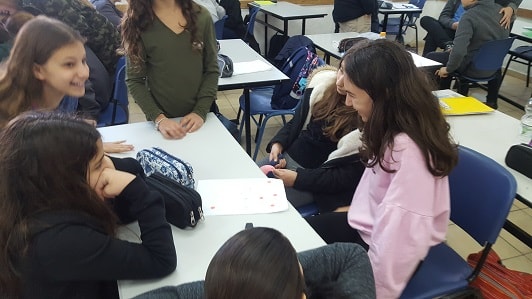
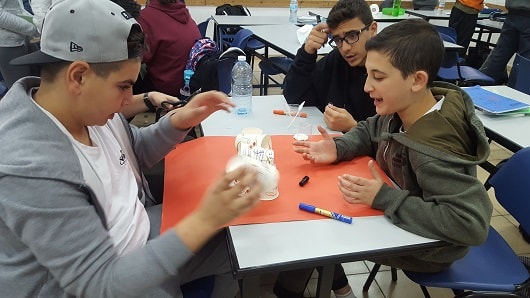
Read about the Hackathon event at ORT Holon.
The leadership group from the Keshet School in Jerusalem came up with an idea for a social community project, which would cultivate a community garden.
Along with the progress of implementing their idea, social coordinator Sharon Cohen and the students practiced tasks that proved they knew how to work as a team.
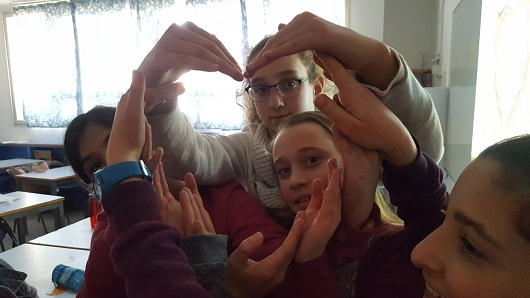
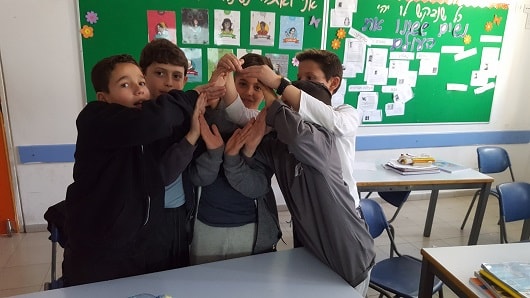
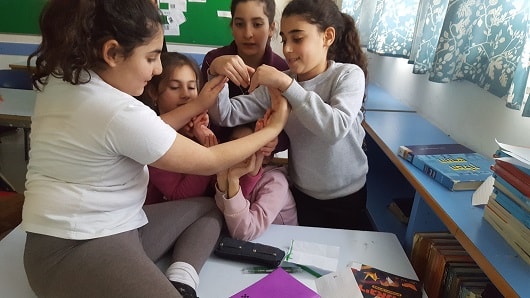
The Sadot School in Pardes Hanna-Karkur, headed by Talmor Klos, educates students for innovative entrepreneurship.
This year, the school hosted a delegation from the Ministry of Foreign Affairs, including leading educators from developing countries.
Guests were impressed by the entrepreneurial culture of the school. They were also impressed with the products and diverse curriculum, which nourishes the children's curiosity, as well as essential life skills from an early age.
It gives us great satisfaction to witness the school's entrepreneurial culture. It all started with the establishment of the Entrepreneurship for Kids Program, and the school took off on its own.
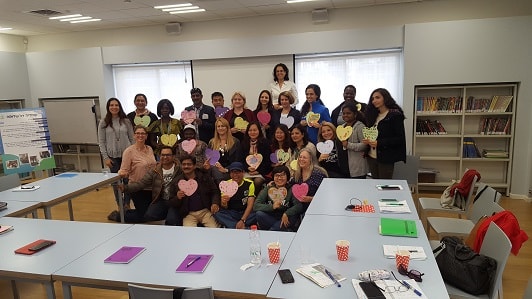
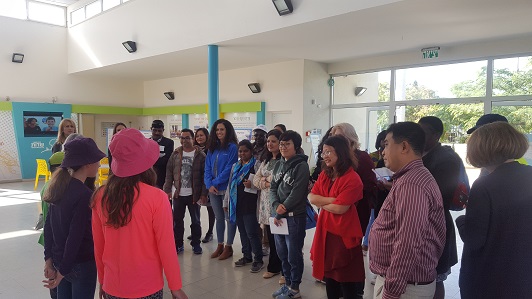
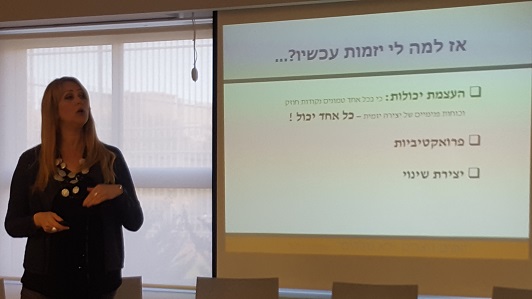
As part of the tour, educators observed a school panel attended by the principal, along with teachers, student representatives, and the parents' committee chairman.
Highlights from the Panel:
Fifth-grade student, Noam: "The teachers chose the entrepreneurial environments, and the students chose which they would join. Ideas and projects are our own. Teachers do not tell us what to do. It is fun to create so many projects. The feeling of being part of it all is fantastic."
School principal, Talmor: "There is a shift in the perception. Teachers do not have all the answers to all the knowledge. They are mentors and instructors who guide children's ideas. Understanding the role of the teacher is important to student entrepreneurship education."
Fourth-Grader, Yaara: "Choosing which project field environment we want to join helps us develop a better product and makes it fun."
Sixth-grader, Ido: "It is nice to see the way the school has evolved because of entrepreneurship. Children have done amazing things. When you are in an entrepreneurial school like this, you are much more involved and aware of what happens around you. You can join in, make a change, and have influence."
Fifth-grader, Ido: "I like the way teams form and think about ideas for projects and put them into practice."
Sixth-grader, Ella: "Many things that exist now were not here when I enrolled in the school. It feels like the students built the school. Entrepreneurship enriches our curriculum. We attend a variety of classes and look forward to the outcomes of our ideas and products."
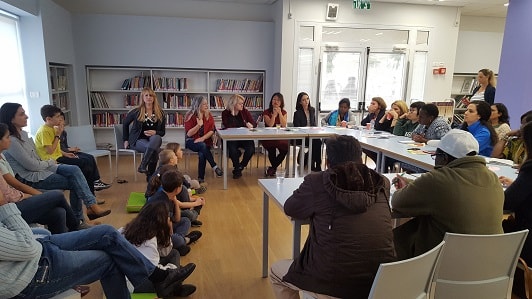
Delegation Participants Ask the Panel Members Questions:
Question: "How do you get teachers, parents, and students to think alike? What were some of the challenges?
Parent representative Eithan replied: "There are clear limits concerning how parents can intervene. The main goal is always to benefit the children. The parents are here to help the school. At times, there are conflicts, but the children are always at the center of what we do.
Question: "How did you decide to focus on entrepreneurial education?"
Principal's answer: "Choosing entrepreneurship was right from the beginning. Everyone was attracted to the idea. The community here is young, and entrepreneurship is a common language that everyone can understand and wants to join in."
Question: "Do you have a teacher evaluation tool for entrepreneurship?"
Principal's answer: "Along the way, we stop, and the entrepreneurial coordinator does reviews. There is also feedback and assessments at the end of the process."
The visit ended with a workshop led by Galit Zamler about entrepreneurship.
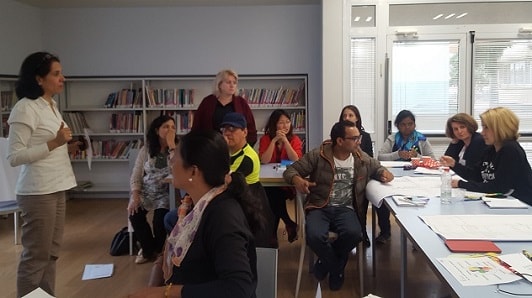
A few days later, a member of the delegation shared her personal experience, inspired by the workshop and visit:
"Inspired by what I learned that day, I did a small experiment with my five-year-old daughter via Skype. The process of finding needs (awareness), forming ideas to get a solution, and coming up with solutions that become a real product.
My husband told me about a problem my daughter had with the ink from her favorite cartoon books (the Doraemon series) on her fingers when she turned the pages and touched the book's images. I didn't notice that the books had been poorly printed by the publisher, and the printed ink didn't adhere to the paper well. I bought her more than 30 books without noticing the problem.
I asked my daughter what thoughts she had about the problem and the need.
She wanted to read the books and not get her hands dirty with ink.
I encouraged her to think about remedies.
She thought about it for a few minutes and decided she could make a machine that automatically turns book pages.
Surprised at her thinking, I told my daughter, her idea was fantastic, but first, we need to see if the product already exists."
Two 4th-grade classes from the Dvora Omer School in Netanya participated in entrepreneurship classes led by Miri Yishay.
After a long year-long process, the students learned about different types of ventures, learned to identify needs, and develop creative thinking. They also identified entrepreneurial characteristics and more.
Before the year ended, the school hosted an event where students shared their learning process and presented their products.
Galit Zamler received an invitation and came to the school to hear and learn more as the students presented their ventures and answered questions. This helped them progress in the process of bringing their ideas to realization.
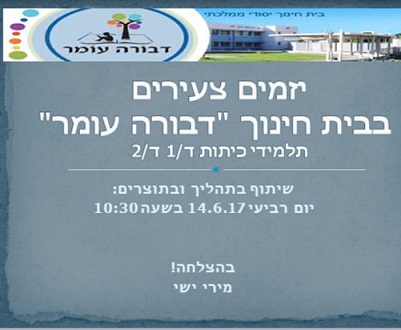
Read about the venture ideas of the students and those realized.
Students were excited to meet Galit, and she enjoyed listening to them as they explained their ideas and how they were using available resources to bring them to life.
Student questions revealed their excitement for advancing their ventures.
Meeting with the students and Miri Yishay, who created the course, was a fun and enriching experience.
Read students' end-of-year reflections.
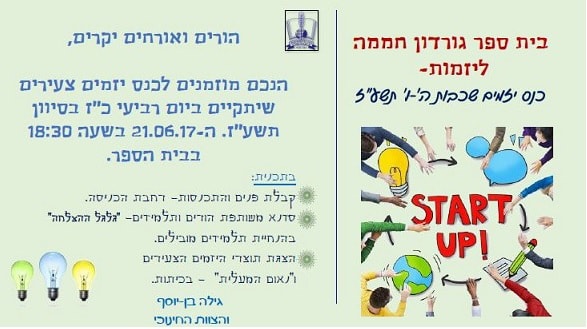
This year, the A.D. Gordon School in Kfar Saba transformed itself into a hub to teach entrepreneurship to its students. The school principal, Gila Ben-Yosef, led the efforts.
The entire school staff participated in an institutional training led by Galit Zamler on entrepreneurship in education. Fifth and sixth-grade teachers attended entrepreneurship classes with their students, based on the EFK program.
Students formed ideas for ventures and learned in their debate classes to present the ideas briefly, but in an intriguing way.
By the end of the year, the school held an "Entrepreneurs Convention" and invited the parents, the mayor, and educators.
Students and school staff were excited about the convention. Students gave the guests business cards they designed themselves, based on the projects they participated in. They presented their ideas first in the schoolyard and then in their classes to their parents.
This sign welcomed the visitors:
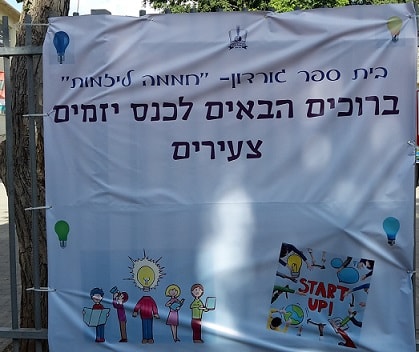
The entrepreneur students are pitching their ideas:

Elevator pitch - Young student entrepreneurs present venture ideas to parents.

The learning process that students underwent impressed the parents, and the young entrepreneurs' convention was marked as a huge success.
Here are some of the parents' comments:
"It just needed a beer tap to make it feel like a real entrepreneurs' convention."
"From what I observed today, the students learned things I studied for my BA."
"This will definitely help them in the future."
The fourth-grade group from the Hebrew Reali School in Haifa participated in the EFK Program guided by teacher Keren Mizrahi. They came up with a project idea for an easy-to-open lollipop wrapper. Read more about this project on the Kids Initiate page.
After developing a prototype, executing a survey among the students, and then upgrading the original idea, students were asked to offer it to a candy company.
For that reason, we scheduled a visit for the young entrepreneurs to meet with the Elite company, part of the Israeli Strauss group.
Company executives greeted the children and watched as they presented their project.
Keren Mizrahi felt an enormous sense of pride in the way the students handled the demonstration and were able to answer questions posed to them by Elite executives.
The visit excited the students, and they were happy for the chance to present their slideshow. They look forward to hearing feedback from the Elite executives concerning their project.
See Photos:
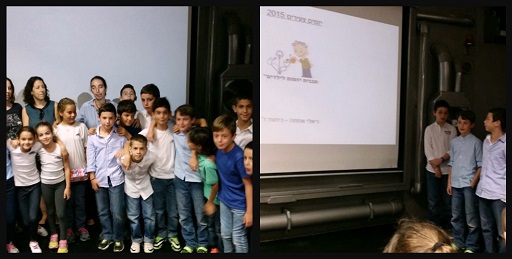
Presentation by students to Elite executives:
Although the Elite executives loved the student's project idea, they asked them to find a solution for using the same wrapping to seal the lollipop without it sticking.
A group of entrepreneurial leaders from the Mordei HaGeta'ot school in Ramat Gan visited the Milbat organization located within the Israeli Sheba hospital grounds.
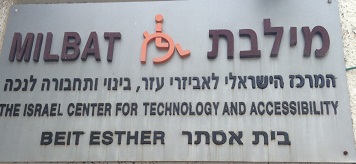
The Milbat Association helps people with disabilities and develops aids for a better quality of life. Student entrepreneurs have great ideas that benefit society. They decided to meet with Milbat.
Entrepreneurship for Kids group, in grades 4 and 5, accompanied by teacher Sarit Alfital, met with Ma'ayan, who is the organization group coordinator.
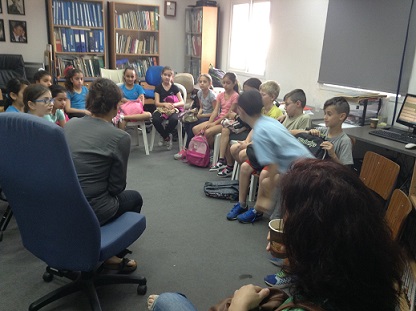
Students saw the Association's website named "Aids, which aims to share knowledge about the 17,000 different aids already developed for the benefit of people with disabilities.
During the visit, the children learned about the challenges faced by people with disabilities and how to help them.
The students watched a video explaining the role of the Milbat Association, established 33 years ago, and in which 420 people from all ages and fields volunteer.
Before watching the video, students asked questions. One was: "What is the difference between a person who has Autism or mental disability and a person who has a mental illness?"
The children learned about the development of accessories for different needs. They were intrigued by the presented objects.
Ma'ayan answered the students' questions about why there are two kinds of crutches and demonstrated the differences.
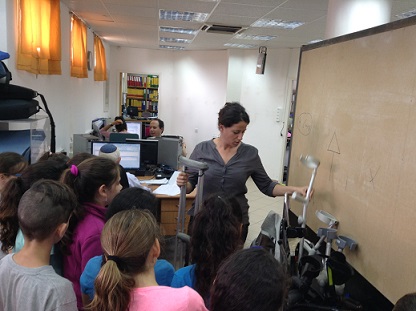
Students also learned about various types of wheelchairs. For example, a wheelchair designed for a person with one healthy hand. They asked about the importance of having a rear brake on the wheelchair. After a demonstration, they learned that the back brake on a wheelchair keeps the person in the chair from flipping backward.
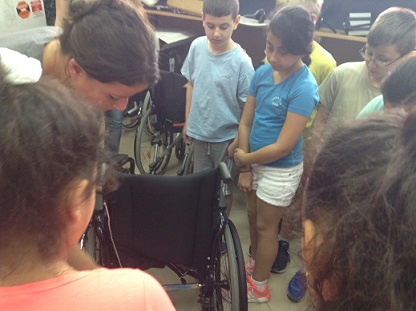
Students believed one of these aids, called an Owl, was a child's plaything. It drew their attention.
They tried giving different explanations for its use: a massage tool, a calling tool, Morse speech, and vocal cord augmentation.
Actually, the Owl is meant for people with a low cognitive response; when you engage the Owl, it responds with two indicators - light and sound. That way, the person using the Owl can learn the connection between action and response, and some love to hold the Owl and feel its vibrations.
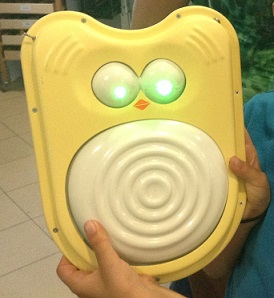
The young entrepreneurs summarized their visit: "It was fascinating. There are many ways to ease the lives of people with disabilities.
Four schools from four different cities in Israel accepted the Hackathon challenge commissioned by the Entrepreneurship for Kids Program. Entrepreneur students, grades four to six, took part in the first part of the first Hackathon in Israel during the 2014 Global Entrepreneurship Week.
The Hackathon was spread over three sessions, and each session was hosted by a different school that hosted the other schools.
The first session: Entrepreneur students came up with many ideas in five different categories and later narrowed them down to three ideas per category.
The second session: Students focused on one idea in each category, created a business and marketing plan, and presented their projects in different ways to all the other attendees.
The third session: Business cards were made, and the projects, now developed to a prototype stage, were showcased and explained in full.
Here is a summarized presentation of the three Hackathon sessions:
Read up on every single Hackathon session and on how students and the education faculty responded to the events on the First Israeli Hackathon for Entrepreneur Students' page.
Check out this article, published in the She'oor Hofshee (Free Class) magazine in March 2015 under the title 'Learning to make dreams come true' (in Hebrew).
Two schools, both implementing the Entrepreneurship for Kids Programs, hosted a delegation of the Israeli Ministry of Foreign Affairs. The members were twenty-two leaders in education from developing countries such as India, Ghana, Kyrgyzstan, Kenya, Nepal, Myanmar, Ecuador, Kazakhstan, Vietnam, China, and Ukraine.
The purpose of the visit was to show the delegation how Israeli schools foster entrepreneurship in education.
The first visit was held at the Kaplan school in Petah-Tikva
In this presentation, we will try and showcase bits of the visit to the Kaplan elementary school, which is an entrepreneurial educator:
Tali Toledano, the school's principal, summarized the tour in the following letter:
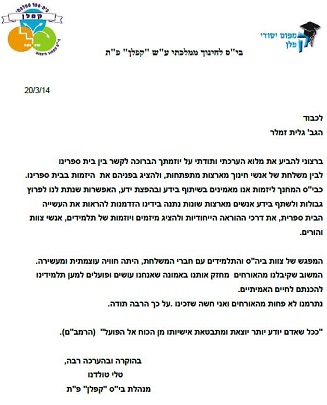
To:
Mrs. Galit Zamler
I want to express my complete gratitude and appreciation for your wonderful initiative to bring our school together with a delegation of educators from developing countries and to present to them the entrepreneurship in our school.
As a school that teaches entrepreneurship, we believe in sharing and distributing knowledge. This opportunity allowed us to break boundaries and share knowledge with people from different countries. You gave us a chance to show our school initiatives, our unique teaching methods, and to showcase initiatives created by students, staff, and parents.
The meeting with the delegation was enriching and experiential. The feedback we received from our guests strengthens our faith in what we do for the benefit of our students and in preparing them for real life.
The visit contributed a lot to us. For that, many thanks.
'The more a person knows, the more his personality comes out and manifests itself.' (Rambam).
With much recognition and appreciation,
Tali Toledano
Kaplan School Principal
Petah-Tikva
The second visit was held at the Mordei HaGeta'ot school in Ramat-Gan
This presentation shows some photos from the delegation's visit to the Mordei HaGeta'ot school that teaches leadership, entrepreneurship, and business management, and is directed by Ronni Shasha.
The visit included a performance by the school band, singing Totzeret Ha'aretz (made in Israel) by Arik Einstein, as part of the school's ongoing support of local Israeli products.
The students gave an English guided tour and presented their ideas. They discussed the needs and insights behind their inventions.
A tour was taken through the different classrooms, showcasing the various classes where students developed their entrepreneurial and leadership skills.
A discussion was held with parents, students, and teachers regarding the school. The delegation members were very impressed to learn that there is a consensus that the Mordei HaGeta'ot school is fostering the future generation of Israel's leadership.
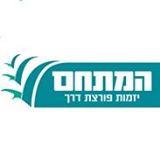
The Entrepreneurship Leadership Class, grades six to eight, from the Mordei HaGeta'ot school, which takes part in the Entrepreneurship for Kids Program, went out for a visit to the Complex (Ha-Mitham), thanks to the generosity of Dr. Eyal Benjamin, Head of the Entrepreneur Department in the Tel-Aviv Yaffo Academy.
Noam Veksler, an entrepreneur and a mentor at the Complex, talked with the students about entrepreneurship, the process the entrepreneur goes through, the difference between wanting and needing, the business model, and the entrepreneur's job, which is to answer needs in a unique and better way than others.
Noam shared with the students his own story. He needed to go out and work at a young age because there was not enough money at home: "I worked from age 11 washing building stairwells."
At age sixteen, Noam had started his own stairwell washing business, managed a few friends, employed them, and paid them a salary.
Noam described his first initiative:
"I recognized a need: People wanted clean stairwells.
The service I was offering, aside from cleaning, that made the building committees hire my services was a guarantee that in any unusual event where cleanup is due, they could call me, and we would take care of it within three hours.
I did not own a car. I rode a bicycle. Strapped to my bike were brooms, buckets, and rags I bought at the market. This is how I would move equipment between my friends and run my business.
The building committees paid me, and I paid my friends. During my first year, I made 125,000 NIS. I had no idea what to do with the money. I spent it on nonsense. That was my first business."
Noam's insight from his stairwell cleaning business is as follows: "What I understood at that age was that people who have a need will be willing to listen to what I had to offer them, and if what I had to offer them was better, I had a good chance at starting a business."
Also, Noam spoke of an incubator he runs in Ireland for teenagers, ages 14-16, who have started learning entrepreneurship, and came up with creative ideas, some for earning money and some for solving a specific need.
After Noam's lecture, the Entrepreneurship Leadership students took a short break. Then they gathered again with two other entrepreneurs from the Complex, Karen Dovkovski, and Erez Gavish, who both told about their initiatives and listened to the students' pitch about the Storage Table. The two entrepreneurs asked questions and gave feedback, as well.
A presentation of the visit:

Fifth-grade students from the Kaplan Elementary School in Petah-Tikva took part in the EFK Program. They set out to visit the Side Kick Company, which develops digital computer games.
All students love playing digital/video games, but they were curious to know how the games are developed, and so the idea to visit Side Kick, one of the most successful game companies in Israel, was born.
Here is a clip of the visit:
A summarization of the insights by Guy Ben Dov, founder of the Side Kick company:
* It is important to identify market trends.
* It is recommended to develop initiatives as a team and not by oneself. Working as a team, where every participant brings their advantages, can lead to impressive achievements.
* It is highly recommended to create partnerships with other companies.
* There are two essential languages: English, as an international language, and the coding language.
* Not everyone needs to be an entrepreneur; some people are not entrepreneurs, but have the utmost importance in the success of ventures run by others.
* An entrepreneur loves his project, which is why one sometimes does not see what the other sees in it.
* Determination and consistency are essential for success.
* A critical factor is time, sometimes more important than money, and one needs to know how to utilize it.
* To succeed, there must be a synergy between those who can come up with good ideas and those who can take action and make moves.
* Communication is vital because if others do not understand your idea, the idea has no value. How to convey our thoughts, so others understand them as we do, is a skill worth working on.
* Always write down and present your ideas. Do it often because ideas can change. That is how we make sure everyone understands our intentions.
* A good combination of creativity, technology, and the business aspect of things is most important for success.
* Game development is complicated at first, easy in the middle, and then complicated once more at the end. It's tough coming up with an exciting idea at first; a game should supply a challenge, but not be too hard. In the end, the main hardship is staying within the schedule.
* Most games are alike in feel or shape to something else.
* We concentrate a few times a year and think of new game ideas that would be challenging, fun, and imaginatively reminiscent of something familiar.
* Feasibility checks are also necessary. Before we develop a game, a graphics designer and programmer build the game in its smallest form to determine if it's fun to play. This stage in the process is the toughest because, in most cases, we see that the game is not, in fact, interesting enough or unique enough compared to existing games.
Students from the HaShalom elementary school in Mevaseret Zion near Jerusalem, guided by teacher Sigal Hadad as part of the Amirim program, participated in the Entrepreneurship for Kids Program.
After students saw ventures from different categories, and after learning about the entrepreneur's craft, they were asked to write down how they present themselves and their ambitions.
Afterward, the students were given examples of business cards and then asked to summarize what they had written onto a single, individual business card.
The business cards were made using the Microsoft Publisher program, and after their completion, the cards were put into badges. From that moment on, the students wore their badges to their entrepreneur classes.
Participants in the EFK Program at the Amirim primary school in Binyamina visited the leading Israeli gaming company, Playcast.
The kids were very interested in the company's work, which was offering a computer game service without having to buy a console.

The students were very impressed with the progress the entrepreneurial company has made since its foundation in 2007.
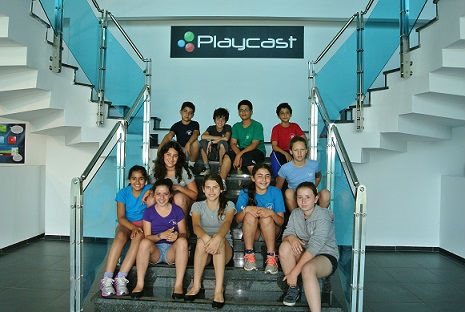
A letter from Hila Attias Almagor, head of the Entrepreneurship for Kids Program in the Amirim school, following the visit to Playcast:
"Hello,
The Amirim elementary school took part in the Global Entrepreneurship Week, which occurs once a year.
115 states across the globe recognize the GEW by having meetings, classes, lectures, competitions, presentations, and more.
Goals:
* Encouraging personal, communal, and business entrepreneurship.
* Exposing youth and other sectors of society to the term of entrepreneurship.
During the program, students visited the Playtech company in Caesaria, which creates games using the cloud.
The company supplies its customers with the ability to play PlayStation games through their television cable box.
During the visit, VP of Technology, Omri Gilat, told the students how the idea was conceived and how it has become a reality.
Students learned what a server farm is, what a communications cloud is, QA (program checking), how to market, how to recruit employees, what it means to raise capital to start a company, and what the options are.
Students experimented with the game, and some even found work for their summer vacation in the Games QA Department. It will be interesting to see who the next Mark Zuckerberg will be.
With thanks,
Hila Attias Almagor"
Read about the Barbari - Health Bar venture, implemented by the young entrepreneurs from the Amirim school.
Ahead of the 2012 Global Entrepreneurship Week, the Yad Mordechai school in Bat-Yam, which teaches entrepreneurship thinking, invited several guests.
One of the guests was a mother of two students, owner of the Florentine Hummusia in Tel-Aviv.

The mother talked to the students about the process of establishing the restaurant and how they marketed the business. To illustrate her point, they made T-shirts together, like the one worn by this young student in the photo.
In addition to the shirts, marketing was done via hats, flyers, and other accessories.
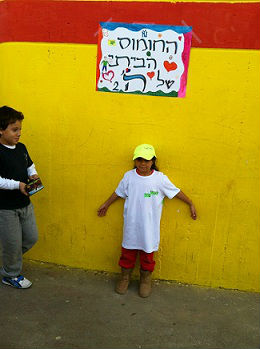
The entrepreneurial mother brought with her hummus, and the kids made hummus sandwiches using pita bread and sold them as part of the Healthy Recess held at the school.
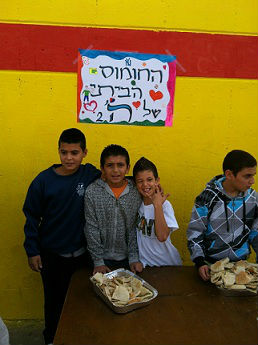
A group of sixth-grade students from the Kaplan school in Petah Tikva, which is an entrepreneurial educator, took part in the EFK Program.
The school principal, Tali Toledano, asked to focus on technology-related initiatives. The students toured a very successful Israeli-based internet company, Wix.
During the visit, the students learned how a company is formed from its initial concept, through funding, and being brought to market, and constantly improving as necessary to succeed.
Parts of the visit can be seen in this video:
The visit was an eye-opening experience. The emails exchanged between the visit coordinators to the Wix company illustrate this:
"Hello Yuval,
The kids, part of the leadership in the entrepreneurship program at the Kaplan school in Petah-Tikva, want to thank you for hosting the visit held on January 16, 2012.
They wrote a gratitude letter, attached here.
I, Dina, and Esti, Communication Coordinators at the school, also want to thank you.
We wrote about you in the school newspaper, and we would be glad to send you a copy when it is published.
Please, convey my thanks to each and every one who took part in the successful visit.
The tour was a triumphant experience that we will forever remember.
Best,
Dina Liberman
Educations and Entrepreneurship Coordinator
Kaplan School, Petah-Tikva"
******
Yuval, a Wix representative responsible for planning the visit to the company, responded to this:
"Hi Dina,
I was thrilled to receive this letter from the students. It was an enjoyable experience for us as well. It is not every day that we have students visiting our offices.
It is a great privilege for us to be forever remembered.
Advance and prosper,
Yuval Finkelstein,
Director of Operations
Wix"
All group members at the Moreshet Moshe School in Ramat-Gan came up with arguments for and against establishing a kiosk in the school.
To make it easier for the kids, we imagined how a supportive environment would react to the idea as opposed to a non-supportive one.
In reality, the entrepreneur hears feedbacks that go either way. Not once has an entrepreneur with a good, different, or revolutionary idea been considered bold or even crazy.
It is good to know the different reactions you may get from the people around you and how to deal with them.
Here are a few of the arguments that the students raised:
AGAINST:
* It won't work in our school
* There are not enough kids at school
* We have no funds for an initial purchase
* Convincing the principal will be hard
* We won't be able to enjoy recess, we'll be working
FOR:
* Everyone would know us
* Adults would respect us
* We would receive compliments from kids and adults alike
* If another school did it, so could we
* We would make a lot of money that could benefit the school
* We'll learn how to do business
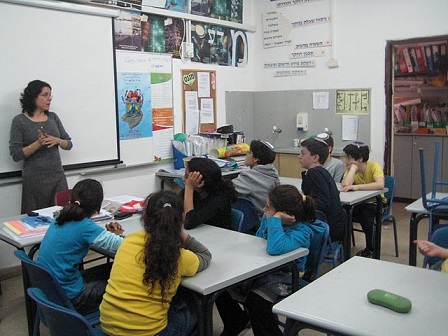
The students learned about inventions that were successful despite some resistance surrounding the ideas. The entrepreneurs remained faithful and motivated and continued working till success.
We played a game in pairs, where we had to define a goal and how to accomplish it.
Everybody achieved their goal and got to the other side of the playing area without speaking and without getting down from their seats.
Conclusion: Forethought and preparation helped achieve the goal.
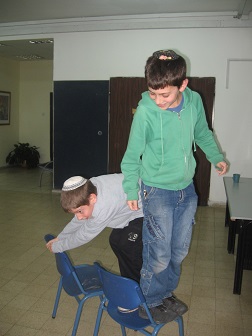
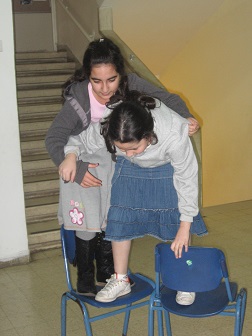
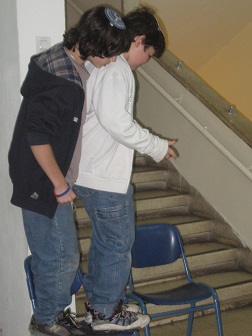
The kids' task was to think of an idea for a project that we would try to implement.
Most kids choose to establish a kiosk, which is why the business plan will focus on building one in the school.
The children had to decide whether they DO or DO NOT want to turn their idea into a reality. They had to think about it after going through the business plan, which would help them understand the venture's potential.
And thus we started writing out a business plan:
Idea: Building a kiosk in the school where all proceeds are for the benefit of the school.
We will sell snacks, small toys, hot chocolate, and sweets.
The need that the project meets: Kids love sweets and games.
Target audience: Our school students
Who are we: Kids participating in the Entrepreneurship program.
Why do we think we'll succeed? Because we are learning about entrepreneurship, we know our clients and work together.
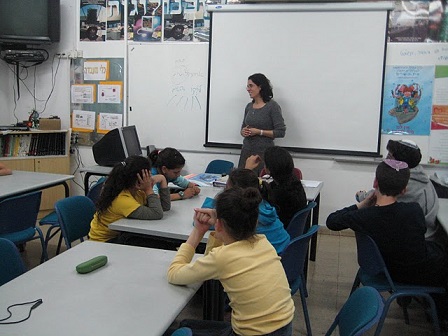
We studied the SWOT model: The kids brought up these points in every section regarding the establishment of a kiosk in the school for a week, where the income is for the benefit of the school:
S - Strengths
* We work together on the venture
* We will have a business plan
* We will have sweets that children love
* We can learn from the experience of the Brenner school in Tel-Aviv
* We behave ourselves, which will help persuade the school principal to approve our idea
* We have the desire to succeed
* Itai spoke to the Science teacher, and she supports us
* The money will benefit the school
* We are students of the school, so we know it, and our target audience
* We are a small group, and therefore effective
W - Weaknesses
* We would like to earn money for ourselves and not for the school
* Our competitors are more experienced than us
* We are a small group - burdensome to each of us
* We have no money
* We will also have to work at home to promote the venture, but we don't like homework
* There is no agreed-upon location for the kiosk
* Our success can hurt student council activities; in that case, the principal won't agree
* We only sell for cash, while Arie grocery accepts credit
O - Opportunities
* Kids love sweets
* The principal can support us because the proceedings are for the school's benefit
* We will sell three days a week so that we can prepare
* The student council, our competitor, only sells once a month
* We know the school students and can convince them to buy
* We shall gain fast publicity due to being located in the school
T - Threats
* The principal might not approve our venture
* Kids will be mad, not getting things for free
* It'll rain
* Kids will forget to bring money
* Kids will vandalize our advertisements
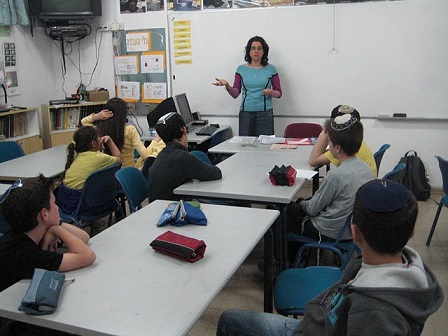
The children learned about positioning and made positioning diagrams of the kiosk against competitors. The goal was to examine what makes our booth unique compared to our competitors. After deliberation and a poll, most kids decided that the kiosk would be cheaper and of a higher quality than the competitors.
To illustrate what positioning meant and how others see us, we played an imagination game with costumes. We asked what one would think of someone with big square glasses (everyone said 'Geek') or someone with colored hair, a cigarette in his mouth, and with a big chain (everybody said 'Punk')?
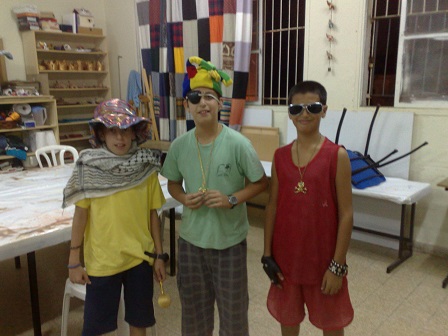
This way, the children concluded that for the target audience to treat their kiosk as a quality one, they needed not just to sell sweets that kids love but also to design the booth appealingly.
When we learned about the brainstorming technique, its stages, and advantages, we noticed that when we started our initiative, we used this technique; Everyone brought up ideas, and we wrote them all down. Only later did we reject some of the ideas and stay with the concept of selling candy that kids love. We did the same regarding the location of the kiosk, where we would store our merchandise, our money, etc.
When we dealt with creativity, we illustrated the need for creative solutions, using enjoyable thinking games.
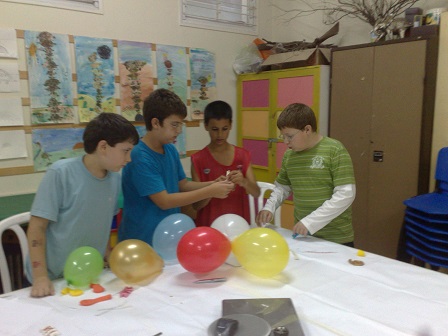
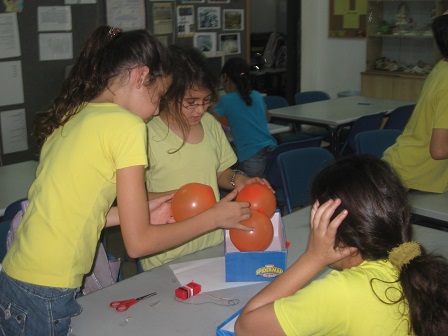
The kids learned the subject of intellectual property. We also learned about trademarking symbols - R, TM. When and where to use them.
We visited a site explaining trademarks and learned how to determine if a particular name is a registered trademark, and if so, whether it is registered in a specific design.
We found in the archive a trademark that Galit Zamler had designed called MissionBooster.
Though the kids did not know the meaning of a Domain name, they understood it when we wrote down an internet address and learned that it is, in fact, a domain name.
We saw instances of copyright infringement, intellectual property theft, and their results. Together, we concluded that infringement and theft are wrong and not worth doing.
The kids looked at the objects they were given for trademark symbols.
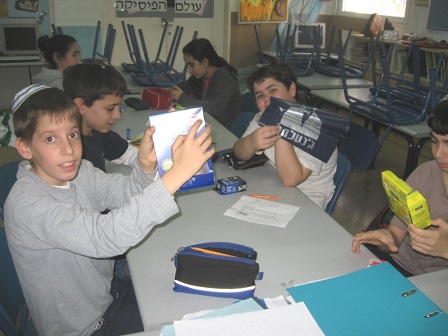
In the second part of our meeting, we learned how to negotiate. We started with an exercise in which every couple of children negotiated on a particular issue.
The negotiations held by the students were amusing, and no real results were achieved.
Then we learned how to conduct negotiations. We spoke about preparation, understanding the other side's motives and how to persuade them, and the possibility of achieving a win-win result.
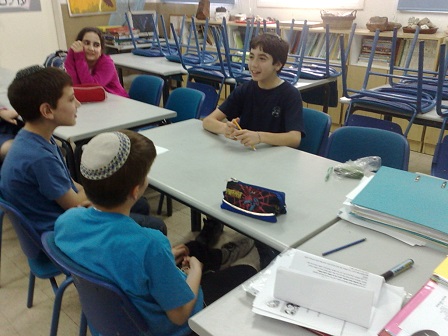
Shai and Itai are negotiating
At this meeting, we learned about pricing and the different pricing methods.
We remembered how we set the pricing for the kiosk sweets: We checked how much they cost us, how much competitors were selling them, we estimated the price our clients would be willing to pay us, and realized that the pricing also depends on the perceived value of the candy by the children.
Shai asked, "How does a manufacturer set the price for a product?" So we explained the production costs plus the profit we are looking to gain (Cost+), the price of competing products, and the perceived value to customers.
Itai told us that his uncle explained to him that if he sees an offer for an advanced computer, but the pricing is very low, that indicates it's a bad offer. Here we started a discussion on the value of cheap products.
We learned about the purchase process that consumers go through in complex (expensive) products, and we also talked about ourselves as irrational consumers.
We brought up instances where we had regretted a purchase that we'd made. Yehonatan, Elamar, and Barak told us of action figures with a computer code they purchased - none of them had anything to do with the figures today. Barak said he had spent his birthday present on such figures and that he was sorry about it.
We talked about teamwork; it's "Do and Do Not Do" principles, and examined factors that may interfere with collaboration.
The example that concerns all the children and which represents the theme of teamwork well is the group's project - the kiosk project. And so, we examined ourselves as a team regarding the points that were brought up.
We held a teamwork activity - The kids were divided into two teams. From the side, you could see that Shai "took up" the role of the leader in one group, and in the other group, it was Matan. All other kids in the groups cooperated, and both teams succeeded in accomplishing the task.
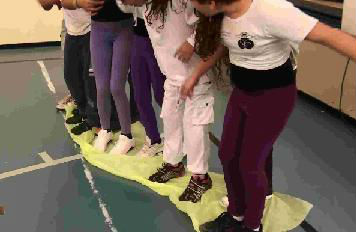
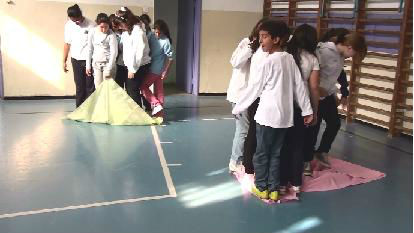
Most terms of the business world that we've learned, the kids were familiar with, but did not fully understand them. To illustrate their meaning, we brought up examples and studied different articles dealing with those terms.
The young students enjoyed a lecture by a guest entrepreneur, Yaela Boker Kriti.
Yaela's initiative: STORYLI - This book is about me
Yaela shared how she came up with the idea for personal storybooks for kids, driven by her need to create an independent business from home.
After assessing what she can do and what she loves to do, she came up with the idea of writing books.
Given that there are so many books out there, she looked for something unique and found it: Writing personal children's books.
Here are some of the questions that the students raised:
Itay: Have you ever written a book only to find out it's been written before?
Itay: Do you illustrate the paintings yourself?
Itay: Did you know the first child for whom you wrote the story?
Yehonatan: Did you take a risk when writing the books?
Yehonatan: How long does it take to write a book?
Yehonatan: How much does each book cost?
Elamar: What is the name of your website?
Elamar: How will you translate your book into other languages?
Yaela surprised the kids and made them a presentation with their pictures tied in as the heroes of her story.
Here is a picture of Nofar:

As requested by the Kaplan school principal, 6th-grade students and participants from the Entrepreneurship for Kids Program learned about subjects from the High-tech field. The chosen topic was Cloud computing. This topic is considered one of the leading in the field of computing today.
To enhance the learning experience, Galit Zamler arranged a visit to Microsoft in Israel, where the kids learned about Microsoft's cloud services and other innovations. The students were very excited about the tour as it was their first time visiting a High-tech company.
In this next video, the entrepreneurial students learn before and during the visit.
Read about many more experiences of students in the Entrepreneurship for Kids (EFK) Program on the Experiences from the program part II page.